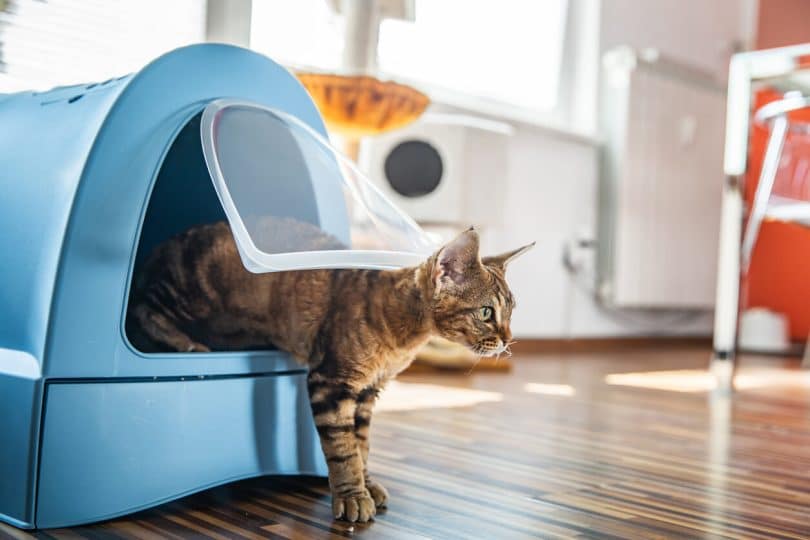The overwhelming majority of cats don’t need you to do this at all and would very much appreciate it if you didn’t try. But some cats with chronic anal gland issues may need their glands expressed as often as every three to four weeks. Other cats will only need it when they’re showing signs of discomfort.
Does Your Cat Need Their Glands Expressed?
Not sure how to tell if your cat needs their anal glands expressed? According to Dr. Simon, the most common signs you’ll notice include:
- Butt scooting: Sometimes your cat will use their butt to scoot around the floor to clean it. However, if this behavior persists, it may indicate that they are irritated and uncomfortable as a result of clogged or infected anal glands.
- An unpleasant, fishy smell: Your cat’s anal glands naturally release a potent scent that helps them mark their territory. However, if you smell something bad coming from their buttocks, it may indicate that the glands are infected and not emptying correctly.
- Overgrooming of the genitalia and anals: You might observe that your cat starts grooming themselves more frequently. They might appear to be biting and licking their genital area all the time. These modifications to their grooming routines may indicate pain and discomfort resulting from inflamed anal glands.
- Anal gland swelling and infection may be the cause of your cat’s painful defecation if they meow or yowl while using the litter box or appear to strain before passing a bowel movement. You may also notice bloody feces, constipation, or diarrhea. All of these indicate that you should plan a visit with your veterinarian.
- Hard masses in the sac area: You will feel hard masses close to the sacs on either side of the anus if the glands clog. In order to facilitate the passage of these blockages, your veterinarian may prescribe a softening agent to be infused into the sac when they become too hard or dry to express normally.
- Oozing sores next to anus: Your cat may have anal sac disease if there are bloody, pus-filled sores next to their anus. Your veterinarian can identify the ailment and suggest the best course of action to help avoid infection and tumors if you notice these sores.
That said, not all cats will show any obvious symptoms. Certain cats may not exhibit any symptoms of an impaction of the anal glands until an abscess has developed and burst. If this occurs, a hole next to the anus will be leaking pus and blood.

How Often Do A Cat’s Glands Need Expressing?
Dr. Simon says cats generally won’t need their glands expressed. Every time a domestic or wild cat passes a solid stool, their glands typically express themselves naturally. Stooling causes the glands to contract, causing secretions to flow out with the stool. Through these secretions, cats can mark their territory and let other cats know where they have been.
Only rarely do cats need regular gland expression. This usually only applies to cats who have persistent gland problems, though obese cats may be more susceptible to anal sac disease.
Regular diarrhea in cats can also make it difficult for them to adequately empty their anal glands, which needs solid stools. They might require manual expression at the veterinarian’s office or at home.
Fun fact: Your cat’s anal glands are related to those in skunks, but unlike skunks, cats can’t empty their glands voluntarily to leave scent. Cats seem to have lost this ability somewhere in evolution, so they can now only empty their glands when defecating.
How To Express A Cat’s Anal Glands At Home
Your veterinarian can demonstrate how to safely express your cat’s glands if you can determine that they are in need of it. Having them walk you through the procedure the first time is always preferable.
Dr. Additionally, Simon contributed her knowledge to this comprehensive how-to guide for at-home gland expression in cats:
- Start by finding a helper. Up front, one person can help keep your cat calm by holding them. The other can work at the back end.
- To save time when cleaning up, think about performing the expression in the shower or bathtub. Additionally, you should gather some cleaning rags or paper towels. Disposable gloves are essential!.
- If your cat has long hair, you might want to trim any extra fur around the anus with clippers.
- Next, feel immediately to the right and left of your cat’s anus to locate the anal glands. These pea-sized sacs will feel like hard lumps if they are blocked. Additionally, you should make sure that your cat’s tail stays out of the way.
- With your helper holding your cat still, slowly start pressing while keeping your cat’s tail out of the way. You will gently press upward on your cat’s anal sacs until the fluid comes out.
- After the liquid has been released, gently clean your cat’s anus and any surrounding dirty fur with a damp paper towel, cat wipe, or rag. For a deeper clean, you could also try carefully sprinkling some lukewarm water over the area, if your cat will allow it.
- Use the paper towels to mop up the fluid. You should contact your veterinarian straight away if you see any blood or pus in this secretion, as this could indicate an infection.
Your cat may be in pain if they become very upset while you try this. Furthermore, some cats just won’t put up with this process at home. In these cases, it’s best to consult the professionals!.
FAQ
How do you know if your cat needs glands expressed?
How often do cats need their anals expressed?
Why does my cat squirt brown liquid?